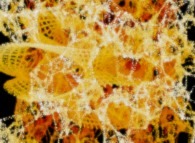Occam's razor and Mathematics
CMAP (Centre de Mathématiques APpliquées) UMR CNRS 7641, École polytechnique, Institut Polytechnique de Paris, CNRS, France
[Site Map, Help and Search [Plan du Site, Aide et Recherche]]
[The Y2K Bug [Le bug de l'an 2000]]
[Real Numbers don't exist in Computers and Floating Point Computations aren't safe. [Les Nombres Réels n'existent pas dans les Ordinateurs et les Calculs Flottants ne sont pas sûrs.]]
[Please, visit A Virtual Machine for Exploring Space-Time and Beyond, the place where you can find more than 10.000 pictures and animations between Art and Science]
(CMAP28 WWW site: this page was created on 03/27/2016 and last updated on 10/03/2024 17:10:26 -CEST-)
[en français/in french]
Guillaume d'Occam was an english franciscan from the fourteenth century. The Occam's razor
(Pluralitas non est ponenda sine necessitate) is a principle and a guide for
scientists: when there are competing hypotheses, the one with the fewest
assumptions should be selected. The victory of the heliocentrism over the geocentrism
is a good example..
Galileo (sixteenth and seventeenth centuries) was the first modern physicist stating that the laws of Nature
are mathematical (the great book of the Universe is written in the language of Mathematics).
Today, Mathematics are everywhere in Physics and they gave us the most beautiful recent scientific discoveries:
the Cosmological Microwave Background, gravitational waves, the quantum intrication,...
Despite the great scientific success of Mathematics, nobody knows what they really are.
There are two main opposite possibilities:
- 1-Mathematics are a "mere" analog compression language for the experimental measures obtained by the experimenters.
As a matter of fact, on the one hand there is order in the Universe. On the other hand there are
mathematical tools and systems (for example differential equations) that behave like natural objects regarding
measures.
In this case, Mathematics can be an invention (the mathematician is a creator, an inventor) or again
be a discovery (the mathematician is a "mere" explorator): it doesn't matter...
- 2-Mathematics are THE Reality.
Then it seems that the Occam's razor is allowed only in the first case for one just wants to simulate something
in the simplest possible way.
On the other hand, in the second case there is no choice: the "things" are as they are...
Copyright © Jean-François COLONNA, 2016-2024.
Copyright © CMAP (Centre de Mathématiques APpliquées) UMR CNRS 7641 / École polytechnique, Institut Polytechnique de Paris, 2016-2024.
